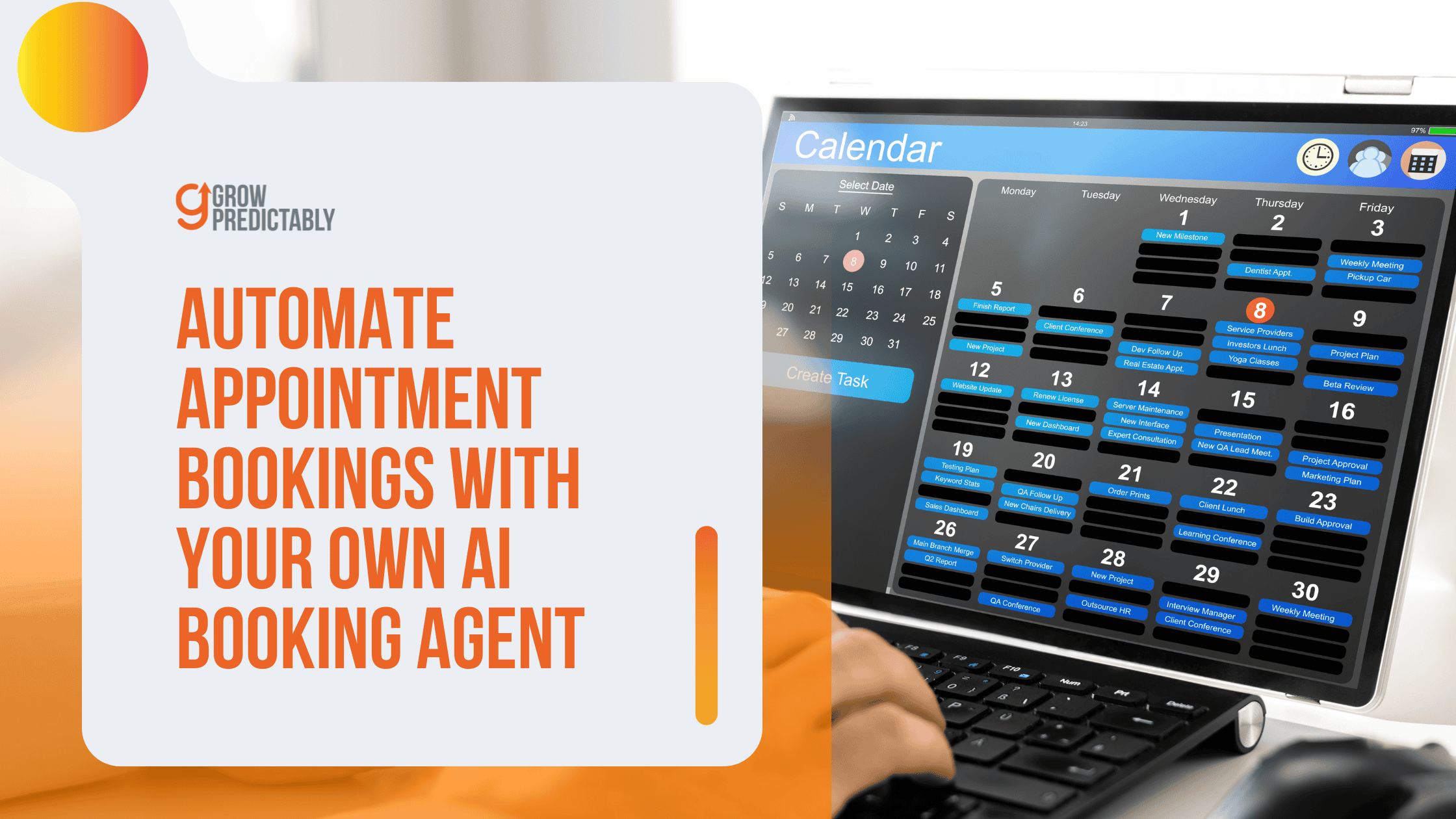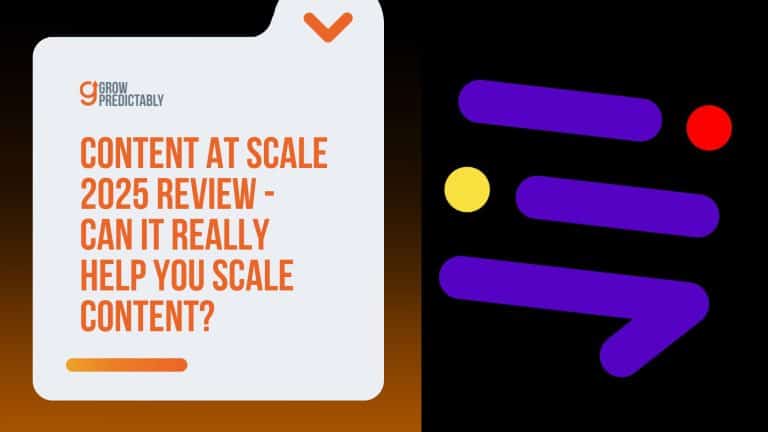Automate Appointment Bookings With Your Own AI Booking Agent
One study that monitored phone calls across 85 businesses revealed that only 37.8% of inbound calls are answered. (Source) That’s revenue left on the table—every–single–day…
Now imagine never missing another booking. This guide shows you how to automate appointment booking with an AI voice agent that runs 24/7, no coding needed.
One client boosted bookings by 45% after setup. If you want to know where you can get started immediately, keep reading—your business may never need a receptionist again.
TL;DR
Use Vapi for speech-to-text, NLP, and text-to-speech and Make to automate integrations. Set up accounts, connect your calendar, create voice prompts, test in Vapi’s sandbox, then enable multilingual and CRM integrations. Start with free tiers, monitor analytics, and iterate prompts to improve booking accuracy and save time.
KEY TAKEAWAYS
- Begin with Vapi and Make free trials, build a Basic Voice Agent template, then run five sandbox tests covering booking, reschedule, cancel, unclear responses, and errors.
- Connect Google Calendar in Make, set a 15-minute update interval (reduce to 5 minutes if needed), add routing for booking scenarios, and save scenario restore points.
- Add CRM integration to greet returning customers and suggest services, enable top customer languages in Vapi, and review analytics weekly to refine prompts and reduce dropouts.
Can You Build a 24/7 Booking Agent to Automate Appointment Booking—No Code?
The cited data above reveals that approximately 62.2% of inbound calls go unanswered in 85 businesses across different industries. That’s potential revenue slipping through your fingers with every missed ring.
But imagine transforming those lost opportunities into confirmed bookings—automatically, 24/7, without hiring additional staff. Today, I’ll show you how to build your own AI booking agent using two powerful, beginner-friendly tools: Vapi and Make.
As a DigitalMarketer certified partner who has implemented automation solutions for businesses of all sizes, I can tell you that this is a game-changer for small business owners struggling with appointment management and fear the need for coding.
Vapi and Make are no-code or low-code development tools. These are just two of the many no-code tools that are leveraged in software development today. In fact, 70% of enterprise applications were expected to be developed with the help of no-code technologies in 2025. (Source)
In this comprehensive guide, let’s break down the entire process of how you can establish your own no-code automated booking agent into three manageable steps.
You’ll learn how to:
- Set up 24/7 voice booking capabilities
- Sync with your existing calendar systems
- Handle cancellations and rescheduling automatically
- Serve customers in multiple languages
Did you know, according to Forbes Business Insight, the global Appointment Scheduling Software Market size is projected to reach USD 1,195.7 million in 2030? (Source) From what the numbers are showing, automated scheduling is going to become the standard.
Your Roadmap to Automation Success
- Choosing the right tools for your business
- Setting up your AI agent
- Customizing your virtual assistant
- Troubleshooting common issues
- Expanding your automation capabilities
- Taking your business to the next level
And here’s something exciting to look forward to: I’ll reveal how you can make your AI agent speak multiple languages fluently—imagine serving your Spanish-speaking customers just as effectively as your English-speaking ones, without hiring additional staff.
Ready to transform your booking system? Let’s dive in and build your 24/7 AI booking agent.
What Powers AI Voice Agents Today?

AI voice agents are revolutionizing how businesses handle calls by combining three powerful technologies: speech-to-text (converting spoken words to written text), natural language processing (understanding the meaning), and text-to-speech (responding with a natural-sounding voice).
But first, what do these terms mean? Let’s get to know their definition.
- Speech-to-Text (STT): an assistive technology tool that can help people with writing challenges. Sometimes called “speech-to-text,” “voice-to-text,” or “speech recognition” technology. (Source)
- Text-to-Speech (TTS): an assistive technology that reads digital text aloud. It’s sometimes called “read aloud” technology. (Source)
- Natural Language Processing (NLP): is a form of artificial intelligence that allows computers to understand human language, whether you write it, speak it, or even scribble it. (Source)
Think of these AI agents as your tireless digital staff members who can:
- Schedule new appointments
- Handle cancellations and reschedules
- Answer common customer questions
- Route complex inquiries to the right team member
- Confirm bookings via text or email
The real-world impact is already remarkable.
How Can Small Businesses Benefit From AI Voice Agents?
- 24/7 Availability: Never miss another after-hours booking
- Reduced No-Shows: Automated reminders and easy rescheduling
- Lower Costs: Save 60-80% compared to human answering services
- Consistent Service: Every caller gets the same professional experience
- Multilingual Support: Serve diverse customers in their preferred language
- Detailed Analytics: Track call patterns and booking trends
AI-powered reservation systems operate around the clock, ensuring bookings and inquiries are captured at any time. In the restaurant industry, this results in an average of just 5% in human error rate across bookings, creating smoother operations and fewer disruptions. (Source)
The technology has matured to the point where even small businesses can afford and easily implement these solutions. But here’s what makes modern AI voice agents truly special: they learn and improve over time.
They can remember customer preferences, adapt their conversation style, and even detect when a caller might need special attention. In the next section, we’ll explore the exact tools you need to build your own AI voice agent. But first, imagine what your business could achieve if you never missed another call or booking opportunity?
Step 1: Choosing Tools That Work for You
Did you know you only need two main tools to build your AI booking agent? Let’s demystify the process by exploring Vapi and Make—two powerful yet user-friendly platforms that work together seamlessly.
Vapi: Your AI Voice Assistant Platform
Vapi is a Voice AI platform designed for developers to create and deploy voice agents. Businesses utilize Vapi to implement voice assistants for tasks like appointment scheduling and customer service.
By integrating Vapi, companies can enhance their booking processes with quick, automated conversations, making it a valuable tool for efficient appointment management. Vapi is your gateway to creating intelligent voice interactions.
Think of it as the “brain” of your booking system that handles:
- Speech-to-text conversion (understanding what callers say)
- Natural language processing (making sense of customer requests)
- Text-to-speech responses (speaking back naturally)
The platform offers a free trial to get started, with paid plans beginning at $49/month for small businesses—perfect for handling up to 500 calls monthly.
Make: Your Integration Powerhouse
Make.com is an automation software platform that allows users to visually create and automate workflows without coding. This helps businesses to connect diverse applications, streamline processes, and design custom workflows with ease.
This tool is valuable for those planning to automate appointment bookings, as it integrates seamlessly with numerous apps to enhance scheduling efficiency. Make is the “conductor” that orchestrates everything behind the scenes.
It connects Vapi to your calendar and other tools using visual, drag-and-drop workflows. No coding required!
Plans start at $9/month, though many small businesses can begin with the free tier.

Your 3-Step Setup Checklist
Let’s look at an overview of how you can use Vapi and Make to create your own AI booking agent.
A) Creating Your Vapi Account
- Visit Vapi.ai and click “Start Free Trial”
- Choose “Basic Voice Agent” template
- Select your preferred AI voice personality

B) Setting Up Make
- Go to make.com and create an account
- Connect your calendar:
- For Google Calendar: Click “Add App” → Search “Google Calendar” → Authorize
- For Outlook: Select “Microsoft Office 365” → Follow the authentication steps

C) Connecting Everything Together
- In Make, create a new scenario
- Add a Vapi webhook trigger
- Connect it to your calendar module
- Test the connection using Make’s built-in checker
Start with the free tiers of both tools to test your setup before committing to a paid plan.
Estimated Costs & Requirements
For a typical small business handling 200-300 calls per month:
- Vapi: $49/month (Basic Plan)
- Make: Free to $9/month (depending on automation complexity)
- Total investment: Under $60/month
Remember, this replaces hundreds of dollars in potential missed calls or receptionist costs. In the next section, we’ll bring your AI agent to life by setting up calendar integration and crafting perfect voice prompts.
But first, take a moment to create your accounts—having them ready will make the next steps much smoother. Looking ahead: Get ready to explore how your AI agent can handle multiple languages and integrate with your existing CRM system—but let’s nail the basics first.
Step 2: Bringing Your AI Agent to Life
Did you know that the most challenging part of setting up an AI booking agent isn’t the technical setup—it’s making it sound natural and work reliably?
An extensive survey done on 3000+ consumers reveal that 86% found AI voices to be unnatural and cold, leading them to view the message as unreliable. (Source)
How your AI booking system creates a natural experience for your prospects is a crucial component, as this can impact brand loyalty. Let’s break this down into three manageable tasks that will have your AI assistant taking real bookings in no time.
A) Calendar Integration
First, let’s connect your calendar to Make so your AI can check real-time availability:
- In Make, create a new scenario.
- Add a “Google Calendar > Watch Events” module.
- Configure these essential settings:
- Calendar ID (from your Google Calendar settings).
- Time window (recommend: next 30 days).
- Update interval (recommend: 15 minutes).
- Add a “Router” module to handle different booking scenarios.
- Test the connection using Make’s built-in checker.
If your calendar sync seems slow, reduce the update interval to 5 minutes for more responsive booking.
B) Writing Your Voice Prompts
Your AI’s personality comes from well-crafted prompts.
Here’s how to write them effectively:
| Section | Text |
|---|---|
| Greeting | “Hello, thank you for calling [Business Name]. I’m your AI booking assistant.” |
| Availability Check | “What day and time works best for you?” |
| Confirmation | “I’ve found an opening for [Date] at [Time]. Should I book that for you?” |
| Contact Info | “Could you please share your name and phone number?” |
| Closing | “Perfect! You’re all set for [Date] at [Time]. You’ll receive a confirmation text shortly.” |
Think of your voice prompts like training a friendly receptionist. AI scripts must accommodate and evoke clarity in each answer for your automated scheduling app to be effective.
“Hi! I’m [Name], the booking assistant at [Business]. Would you like to schedule, change, or cancel an appointment?” The example above provides clear options that help the user further their inquiry.
Quick wins for your prompts:
- Keep initial greetings under 8 seconds
- Offer clear choices (“schedule, change, or cancel”)
- Confirm details back to callers
- End with next steps
At this point, you’re now halfway through the setup process!
C) Testing in Sandbox Mode
Before going live, thoroughly test your AI agent. Access Vapi’s sandbox environment.
Make 5 test calls covering these scenarios:
- Standard booking
- Rescheduling
- Cancellation
- Handling unclear responses
- Testing error messages
If you’re new to Vapi, it helps to be aware of the common errors that you can avoid early to ensure better results.
Common beginner errors include:
- Forgetting to handle “um” and “uh” in voice recognition.
- Not setting timeout limits for responses.
- Missing confirmation numbers in bookings.
After you’ve tested out your AI booking agent, it’s time for customizations that will keep it informed, on brand, and fully functioning. But before that, it helps to go through this checklist below.
AI Booking System Post Setup Checklist
You’re making excellent progress! Now, don’t forget to save your Make scenario after each successful test. This creates restore points you can return to if needed.
In the next section, we’ll explore how to add powerful features like multilingual support and CRM integration that can transform your basic AI agent into a booking powerhouse.
Step 3: Customize and Supercharge Your AI Assistant
Ready to take your AI booking agent from good to exceptional? While the basic setup handles appointments beautifully, these powerful customizations can transform your automated assistant into a truly intelligent business asset.
Let’s explore three game-changing upgrades that you can implement when you’re ready.
A) Multilingual Support: Speak Your Customers’ Language
Nothing builds trust like communicating in a customer’s preferred language. In fact, according to CSA Research, 75% of consumers prefer to buy products in their native language, underscoring the importance of multilingual support for global businesses.
Here’s how to make your AI assistant multilingual:
- Access Vapi’s Agent Configuration panel
- Navigate to “Language Settings”
- Enable additional languages (currently supports Spanish, French, German, and 12 others)
- Set up language detection rules:
- Previous customer preference from CRM
- Initial greeting in multiple languages
- Automatic language switching based on caller response
EXPANDING CUSTOMER BASE WITH MULTILINGUAL SUPPORT
Monese, a European fintech company, improved customer satisfaction and expanded its user base by integrating Smartling’s Zendesk plug-in for multilingual customer support. This solution enabled agents to efficiently handle inquiries in multiple languages, significantly reducing response times and streamlining workflows. As a result, Monese enhanced customer retention and successfully supported its growth across diverse European markets. (Case Study)
B) CRM Integration: Personalize Every Interaction
Transform cold calls into warm welcomes by connecting your AI assistant to your customer database:
- In Make, create a new scenario connecting Vapi to your CRM
- Add these powerful personalization options:
- Greet returning customers by name
- Reference their last visit
- Suggest appointments based on service history
- Note preferred appointment times
Example Flow
Incoming Call ➡️ Check CRM ➡️ If it’s a returning customer ➡️ “Welcome back, [Name]. Would you like to book your usual [Service] with [Preferred Provider]?”
C) Performance Analytics: Track and Optimize
Monitor your AI booking agent’s performance and fine-tune for better results. This will help you ensure that things are working as designed.
Here’s what you can do:
Set up a Google Sheets dashboard to track
- Call completion rates
- Booking success percentage
- Common dropout points
- Peak calling times
- Language preferences
Reviewing your analytics weekly allows you to spot mishaps in your automated booking system that might cause more damage if left unchecked.
Here are signs that it’s time to adjust your prompts:
- High call abandonment at specific points
- Frequent misunderstandings of certain phrases
- Underutilized time slots
Always remember, these optimizations are entirely optional but can significantly impact your business’s efficiency and customer satisfaction. Start with the enhancement that best addresses your current business needs, then gradually implement others as you grow comfortable with the system.
Now let’s tackle common troubleshooting scenarios to ensure your enhanced AI assistant runs smoothly.
How to Fix Common AI Agent Issues Fast!
Let’s tackle the most common AI agent hiccups you might encounter—and their quick fixes.

As someone who’s implemented numerous AI and automation solutions in different business cases, I can tell you these issues are normal and entirely solvable.
Speech Recognition Problems
If your AI booking agent or system isn’t recognizing words correctly, here’s what you can do:
- Check your mic settings in Vapi’s configuration panel
- Simplify prompt language (avoid industry jargon)
- Add alternative word recognition patterns
- Increase speech recognition confidence threshold to 0.7
PRO TIP: Test your AI agent with different accents and background noise levels to ensure robust performance.
Booking Synchronization Issue
Double bookings can cause chaos in your schedules with clients.
To prevent this from happening, make sure to:
- Verify Make’s webhook timing (set to real-time)
- Double-check calendar buffer settings
- Ensure proper error handling in Make flows
- Add a secondary availability check before confirmation
Add a 2-minute buffer between appointments to prevent overlap during high-traffic periods.
Call Flow Problems
Here’s a rule that almost all customer service reps know: As much as possible, do not hang up on a customer!
That rule applies even to your automated AI booking system.
Here’s how you can do that:
- Extend the initial greeting wait time to 3-5 seconds
- Add a “Still there?” prompt after 2 seconds of silence
- Adjust the silence detection threshold
- Implement a “press 1 to continue” backup option
Data Integration Errors
You want your automated booking system to take all of the manual recording of customer information off your table.
If it fails in doing that, that could just mean more work for you.
To prevent this:
- Verify field mapping in Make flows
- Check for proper data formatting
- Ensure CRM API connections are active
- Test with sample data before going live
Emergency Toolkit
Keep these handy for quick troubleshooting:
- Vapi’s built-in call recording feature
- Make’s real-time execution log
- Calendar sync status checker
- Test caller number list
PRO TIP: Run a weekly “health check” using this simple process:
- Make a test booking
- Attempt a cancellation
- Try rescheduling
- Check data flow to CRM
- Verify calendar updates
Most issues can be resolved by checking these three areas first: speech recognition settings, webhook timing, and data flow connections. By proactively monitoring these common issues and implementing the fixes above, you’ll maintain a reliable AI booking system that your customers can count on.
In the next section, we’ll explore how to take your automation even further with advanced features and integrations.
How You Can Go Further With Tools, Templates, and Your Next Automation Plan
Now that you’ve mastered the basics of AI appointment booking, let’s explore how to expand your automation toolkit and maximize your system’s potential.
Based on my experience implementing these solutions across various businesses, I’ve seen firsthand how the right templates and expansions can transform operations.
Your Startup AI Agent Kit
To help accelerate your journey, I’ve curated a comprehensive startup kit that includes:
- Pre-configured Make flows for common booking scenarios
- Test call scripts and quality assurance checklists
- Voice prompt templates optimized for different industries
- Performance tracking spreadsheet templates
Advanced Make Integrations Worth Exploring
Take your automation to the next level with these powerful extensions:
SMS Reminder System
- Connect Twilio through Make to send automated booking confirmations
- Create dynamic reminder schedules (24h, 12h, 1h before appointments)
- Include custom cancellation links in messages
Payment Collection Flow
- Integrate Stripe or Square for deposit collection
- Automatically trigger payment requests post-booking
- Send receipt confirmations via email or SMS
Enhanced Contact Management
- Sync customer data with your CRM
- Track booking history and preferences
- Create automated follow-up sequences
Vapi’s Next-Level Features
Keep an eye on these game-changing capabilities:
- Emotion Detection: Analyze caller sentiment to adjust responses
- Custom AI Personalities: Match your brand voice perfectly
- Multi-Context Memory: Remember past interactions for personalized service
READY TO LEVEL UP?
Consider this question: What could your team accomplish if routine phone tasks were completely automated?
The possibilities extend far beyond basic appointment booking:
- Proactive appointment reminders
- Automated follow-up surveys
- Intelligent lead qualification
- Customer feedback collection
Remember, every automation you add compounds the benefits of your AI booking agent. As seen in a McKinsey & Company Report, businesses experience a typical ROI range of 30% to 200% within the first year for automation projects. (Source) Your journey into AI-powered automation is just beginning.
What will you automate next?
⮞ What is the best app for scheduling appointments?
There are several top-rated apps for scheduling appointments, each with unique features suited to different needs.
Here are some of the best options:
• Square Appointments: Integrated with Square’s payment processing, beneficial for businesses that require seamless transaction capabilities.
• Calendly: Known for its ease of use and integration capabilities with other tools.
• Acuity Scheduling: Ideal for businesses that require customizable booking options and automated reminders.
• Setmore: Offers a user-friendly interface and is suitable for small to medium-sized businesses.
• Booksy: Often preferred by service-oriented industries, providing features like appointment reminders and client management.
⮞ What is an automated appointment?
An automated appointment refers to the use of software tools to allow clients or customers to book time slots without manual intervention.
This is how it adds value:
• Integration with Calendars and Payment Systems: Streamlines the process by syncing appointments with digital calendars and facilitating upfront payments.
• Efficiency: Eliminates the need for back-and-forth communication to find suitable time slots.
• 24/7 Booking: Clients can book appointments at any time, improving accessibility.
• Automated Confirmations and Reminders: Reduces no-shows by sending automatic reminders via email or SMS.
⮞ Does Google have a free scheduler?
Yes, Google provides a free scheduling tool through Google Calendar, which is part of its suite of productivity applications.
With Google Calendar, users can easily create and share events, send invites, and view availability.
It integrates well with other Google services, making it a convenient option for those already using the Google ecosystem.
Google Calendar is free for anyone with a Google account and offers appointment slots, which can be particularly useful for businesses that need clients to book specific times.
This tool facilitates efficient scheduling without the cost associated with many other scheduling applications.
⮞ Can automated appointment systems integrate with customer relationship management (CRM) tools?
Yes, many automated appointment systems offer seamless integration with customer relationship management (CRM) tools.
This integration provides several strategic advantages:
• Comprehensive Customer Data: By linking appointment scheduling with CRM systems, businesses can maintain a centralized database of customer interactions, preferences, and history.
• Personalized Customer Service: Access to detailed customer information enables businesses to tailor their services and communications, enhancing the overall customer experience.
• Streamlined Operations: Integration reduces the need for manual data entry, minimizes errors, and ensures that all customer interactions are logged in real-time.
• Informed Marketing Strategies: Businesses can leverage this integrated data to identify trends and tailor their marketing efforts, targeting customers with the right offers at the right time.
• Improved Follow-up and Retention: Automated systems can trigger follow-up actions based on scheduling patterns, aiding businesses in nurturing customer relationships and improving retention rates.
This capability transforms appointment data into actionable insights, enhancing both operational efficiency and customer engagement.
Your AI Agent Is Just the Beginning
Congratulations! You’ve successfully built your own AI-powered booking agent—a significant achievement that puts you ahead of many small businesses still stuck in manual scheduling.
Through this guide, you’ve mastered essential skills: integrating calendar systems, crafting effective voice prompts, and implementing no-code automation that works while you sleep.
What’s The Real Business Impact?
But let’s talk about what this really means for your business. Those missed calls that used to cost you customers? They’re now transformed into confirmed bookings.
The hours your team spent juggling phone lines? Redirected to enhancing face-to-face customer experiences.
Based on my experience working with small businesses, this type of automation typically reduces missed calls by 85% and cuts administrative costs by 30-40% within the first three months.
The Future of Automation
Here’s where things get really exciting: your AI booking agent is just the tip of the automation iceberg.
Imagine:
- Your AI proactively calling customers to fill last-minute cancellations
- Automated post-appointment SMS surveys that feed directly into your customer database
- Multi-channel booking experiences that sync across phone, web, and mobile
- Predictive scheduling that suggests optimal appointment times based on customer history
Just remember, today’s automated booking agent could be tomorrow’s comprehensive business assistant. The future of small business automation is here—and you’re already part of it.








![7 Best AI Story Generators in 2026 for Your Next Story [Ranked]](https://growpredictably.com/wp-content/uploads/2023/12/AI-Story-Generators--768x432.png)